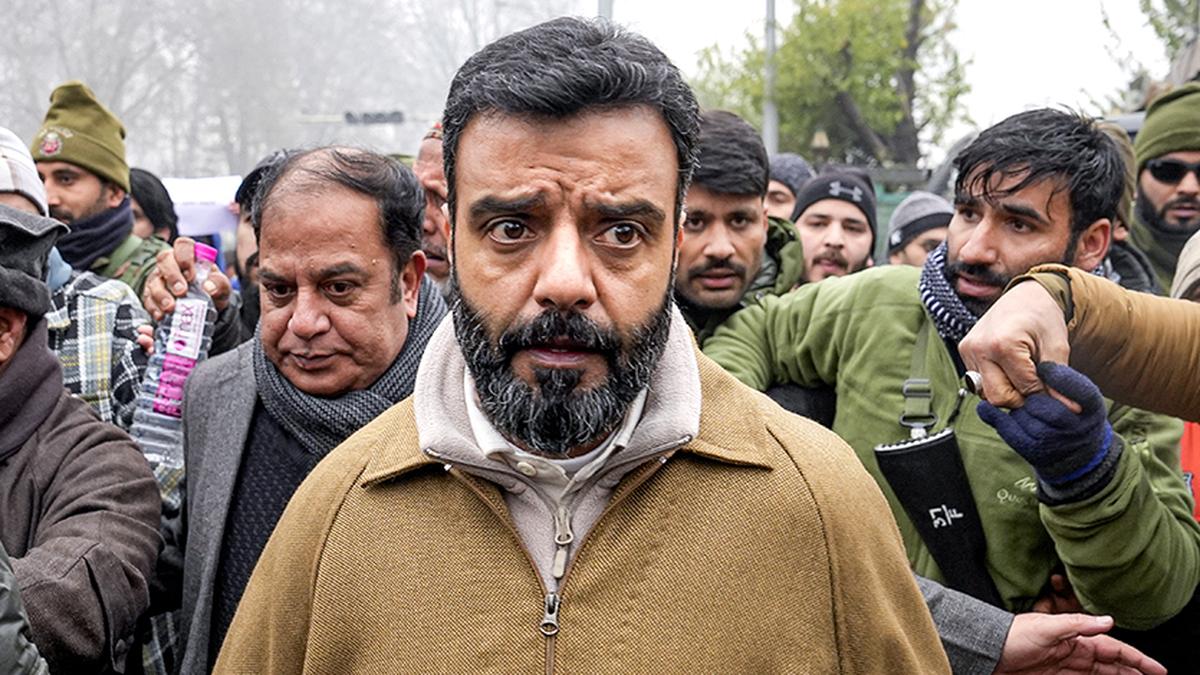 |
|
The recent political landscape in Jammu and Kashmir has been significantly impacted by a controversy surrounding National Conference (NC) MP Aga Syed Ruhullah's participation in a protest against the current reservation policy. This protest, which took place outside the Chief Minister's residence in Srinagar, involved several opposition parties and students, and has ignited a fierce internal debate within the NC, exposing fissures in party unity and highlighting the sensitive nature of the reservation issue in the region. The central figure in this controversy is Mr. Ruhullah, who faced strong criticism from fellow party member Salman Sagar, an MLA from the Hazratbal Assembly constituency. Sagar publicly denounced Ruhullah's participation in the protest, characterizing it as an individual action not reflective of the party's official stance. Sagar emphasized that the NC only organizes protests under the explicit direction of senior party leaders, such as Dr. Farooq Abdullah and Omar Abdullah, implicitly suggesting that Ruhullah's actions were unauthorized and potentially detrimental to the party's image.
Sagar's criticism went beyond simply questioning the protest's authorization. He accused Ruhullah of aligning himself with the NC's political adversaries, thereby inadvertently bolstering their positions. This accusation directly implicated Ruhullah in potentially damaging the party's credibility and strategic standing within the complex political dynamics of Jammu and Kashmir. Sagar's remarks highlighted the potential damage caused by Ruhullah's actions, emphasizing that no individual, regardless of their position or electoral mandate, is above the party. He emphasized the importance of party unity and discipline, especially in handling sensitive issues like the reservation policy. The gravity of Sagar's criticism underscores the internal power dynamics within the NC and the potential consequences of individual actions defying party line.
Ruhullah responded to Sagar's criticism through a social media post on X, invoking the concept of 'house Negroes and field Negroes' from a Malcolm X speech. This metaphorical response, while avoiding direct confrontation, subtly suggested a power imbalance within the party and hinted at Ruhullah's belief that his actions were motivated by a genuine concern for the people, independent of party politics. The use of this powerful historical reference further escalated the controversy, adding a layer of social and political commentary to the already tense situation. The Congress party, an ally of the NC, also weighed in, criticizing Ruhullah's actions and questioning his judgment as a responsible MP. This external criticism solidified the perception of Ruhullah's actions as a serious breach of party discipline and potential damage to the broader political alliances.
Meanwhile, the reaction from other political parties further highlighted the multifaceted nature of the reservation policy debate. PDP president Mehbooba Mufti criticized Chief Minister Omar Abdullah for not adequately addressing the issue, asserting that the current policy disproportionately affects open merit aspirants. Mufti's criticism underscored the broader dissatisfaction with the reservation policy and its impact on student opportunities, thereby situating Ruhullah's protest within a larger context of widespread discontent. She advocated for a more equitable system, urging a review and rationalization of quotas to ensure fairness. The BJP, on the other hand, issued a strong warning against any attempt to tamper with the existing policy, asserting that this would infringe on the rights of marginalized communities. This stark contrast in viewpoints underscores the deeply entrenched political divisions surrounding the reservation issue and its complex implications for different social groups in Jammu and Kashmir.
The controversy surrounding Ruhullah's protest reveals a deep-seated conflict within the NC regarding its approach to the reservation policy. While Sagar prioritizes party unity and adherence to established protocols, Ruhullah appears to prioritize direct action in addressing the concerns of his constituents. This disagreement highlights the inherent tension between maintaining internal party cohesion and responding effectively to pressing social issues. The incident also underscores the volatile political climate in Jammu and Kashmir, where even internal party disagreements can have significant public and political ramifications. The ongoing debate surrounding the reservation policy remains a critical point of contention, with diverse perspectives and potential consequences for all stakeholders involved. The fallout from Ruhullah's actions will likely continue to shape the political landscape of Jammu and Kashmir in the coming months, highlighting the complex interplay between party loyalty, political opportunism, and the imperative to address the concerns of marginalized communities.
Source: Ruhullah faces barbs from NC party colleague on staging protest outside CM’s residence
